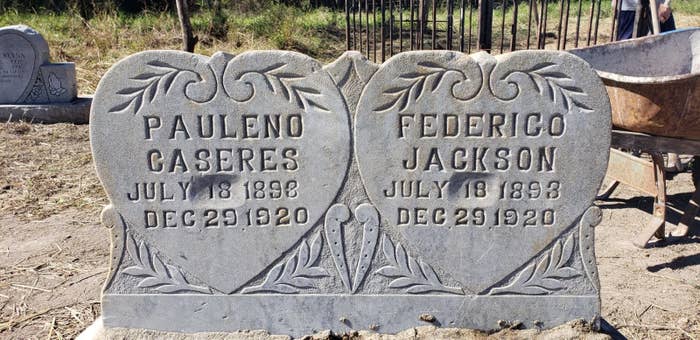
WASHINGTON — A Texas landowner who is suing over President Donald Trump’s national emergency declaration is worried his ancestors’ bodies will be dug up if border wall construction passes by his land.
Ramiro Ramirez, who owns property that covers two historic cemeteries along the US–Mexico border, is one of seven plaintiffs in a new lawsuit filed Thursday afternoon in federal court in Washington, DC. The case is the latest in a series of lawsuits challenging Trump’s use of a national emergency declaration to free up billions of dollars in federal funds for the border wall construction.
Ramirez was unable to speak with BuzzFeed News, but his sister Sylvia Ramirez said in a phone interview that the federal government had been surveying land around the Jackson Ranch Church and Cemetery and the Eli Jackson Cemetery, and that the Ramirez family had not received clear answers from Customs and Border Protection officials about the government's plans.
“We have such a deep, strong connection with our ancestors and with the land and with the final resting place of most of my Jackson ancestors,” Sylvia Ramirez said. “That’s where I plan to be buried and where my brother Ramiro wants to as well.”
Trump announced on Feb. 14 that he was declaring a national emergency over the border, a move that would give him access to $3.6 billion in military construction funds to pay for more sections of the wall he promised to build along the US–Mexico border. The administration also plans to tap up to $2.5 billion in money designated for Department of Defense counterdrug efforts and $600 million from the Treasury Forfeiture Fund, in addition to the $1.375 billion appropriated by Congress.
According to the lawsuit, which BuzzFeed News reviewed in advance of filing and is being brought by the environmental advocacy group Earthjustice, Jackson family members are buried in both cemeteries. Sylvia Ramirez said her great-great-grandfather Nathaniel Jackson built the church in the late 1800s, and most of her direct ancestors are buried in the Jackson Ranch Cemetery. The Ramirez family has been raising alarms about the future of the cemeteries for several months.
“There are survey markers that reach all of the way to the road, which is the front of the property where the cemetery is located,” Ramirez said. “They have an interest in the entire property, and what that interest is, is not clear.”
A spokesperson for the CBP told BuzzFeed News in a statement that the two cemeteries lie within the “enforcement zone” of a proposed border wall site, but it was not part of a “recently awarded contract.”
“In circumstances where cultural and/or historical resources exist within the alignment of planned barrier, CBP employs mitigation strategies to avoid or minimize impacts to these resources to the greatest extent practicable,” the spokesperson said.
The plaintiffs in the latest lawsuit echo arguments in other challenges filed to date that there is no emergency that justifies the president’s actions, and that funding border wall construction through money designated for military construction is an unconstitutional end run of Congress.
Other plaintiffs in the latest case include the Rio Grande International Study Center — an environmental group focused on the Rio Grande river — the Carrizo/Comecrudo Tribe of Texas, an association of indigenous peoples who have lived around the Rio Grande, a woman who lives near the Rio Grande, the Labor Council for Latin American Advancement, the California Wilderness Coalition, and GreenLatinos.
Juan Mancias, the council chair of the Carrizo/Comecrudo tribe, told BuzzFeed News that ancestors of tribe members are buried in the two cemeteries as well. The tribe is also concerned about the effect of border wall construction on members who have homes near the border and on the animals that live around the area.
“We have to keep our little corner, our piece of land where we can follow our ways,” Mancias said.
UPDATE
Updated with information that the lawsuit was filed.

